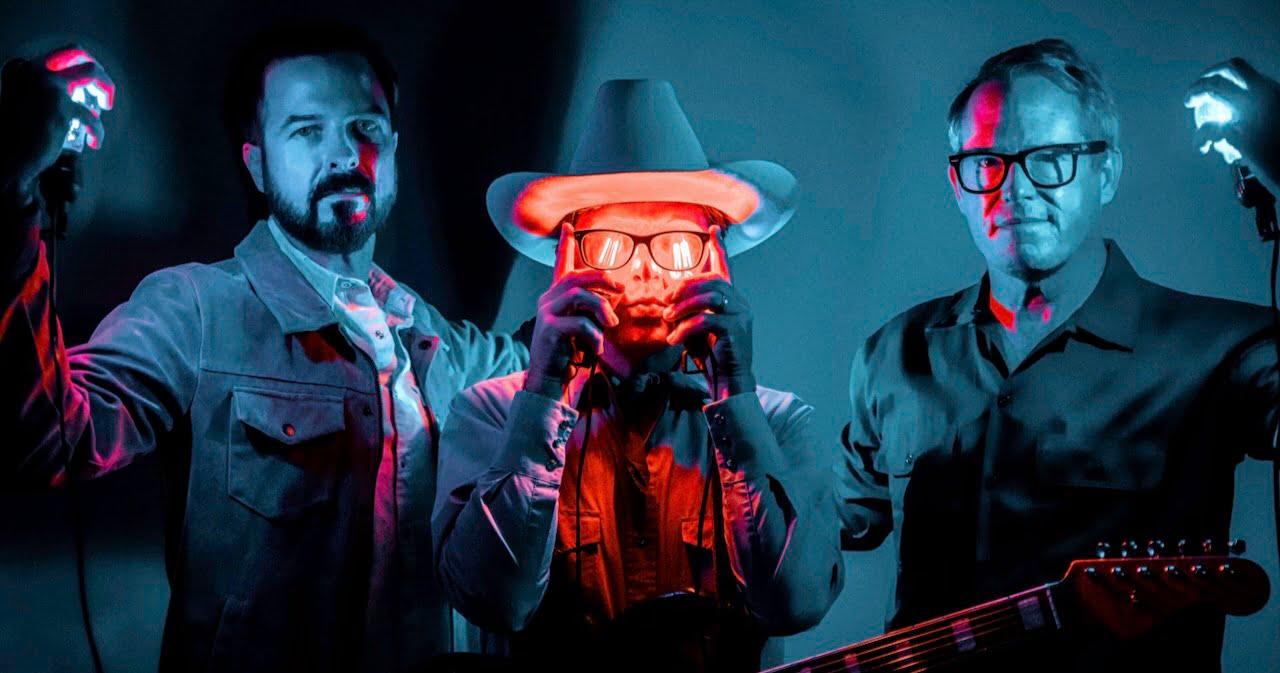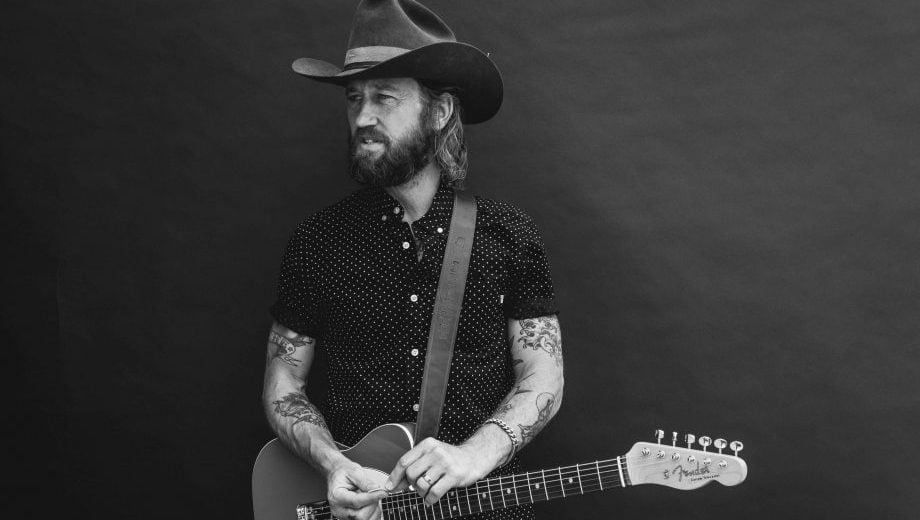For nearly a quarter century, North Carolina-based Chatham County Line have pushed the boundaries of American roots music, but with their new album, Hiyo, they’ve finally knocked them down.
Released January 26, the album contains some of the band’s most far-flung soundscapes to date, as they introduce synths, drums, and other sonic elements to their repertoire for the first time ever. The resulting creations sound more like synth-grass than bluegrass, with everything from drum machines to stretched out harmonicas, harmoniums, and other oddities guiding the way. According to guitarist, vocalist, songwriter and founding member Dave Wilson, the drastic shift in direction stems in part from the departure of banjo player Chandler Holt, who stepped away from the band following 2020’s Strange Fascination to spend more time with family.
“We listen to all kinds of music so I wanted to make an album that reflected that,” Wilson tells BGS. “We knew when Chandler left that we didn’t want to just do the same thing we’d always done with a different person on banjo. That’s not how artists grow in the world. You instead look at something as a springboard for change, which is exactly what we did in moving toward a sound that more closely resembles the music we enjoy playing when nobody’s watching.”
The experimentation on Hiyo was further encouraged by its producer, Rachael Moore, who the band met during their time portraying George Jones’ backing band on the Showtime series, George & Tammy. Both the opportunity to be a part of that show — which manifested itself through a friend of a friend — and meeting Moore were complete happenstance, with the latter seeing the two parties build an instant rapport.
“Anybody that works in the studio with T. Bone Burnett that many times and has been a part of records like [Robert Plant & Alison Krauss’ Raise the Roof] is alright by me,” praises Wilson. “That’s the kind of music I listen to, so us making that connection to Rachael made us realize how hard a worker she is and how much she understood the sound we were going for. We knew then she was who we wanted to record our next album with.”
Speaking with BGS from his home near Raleigh, Wilson further touched on the band’s connection to George & Tammy, the similarities between the recording process and being on a film set, Phoebe Bridgers’ influence on one of Hiyo’s songs and more.
Who are some of the bands you’ve been listening to that helped inspire the sonic shift of Hiyo?
Dave Wilson: That last Sarah Jarosz record really blew me away. She’s just a phenom. There’s also two radio stations that I listened to religiously throughout the writing process for this album. Whenever I’m messing around with a guitar or building a tube amp in my basement I listen to the radio, and one of the stations I tune into is called “That Station” here in Raleigh. They play everything from us to Mipso – and a bunch of other local acts – in addition to bigger Americana artists making waves. That’s where I heard the Sarah Jarosz stuff.
Being tuned into what people are doing today is very important to me, because I’m a part of this too. If I’m asking people to listen to me instead of Led Zeppelin then I need to listen to Sarah Jarosz instead of Led Zeppelin, because she’s a living, breathing artist that deserves that respect. I take a lot of joy out of not only buying modern albums, but listening to radio that supports those artists as well.
On the flip side, I love WWOZ 90.7 FM in New Orleans. That’s on constantly and is full of crazy, disparate sounds, old songs, funny blues stuff and more. I never get bored of DJ Black Mold down there.
How did the rapport working with Rachael Moore on George & Tammy translate to the studio with these songs?
I’ve listened to a million records and I really wanted this one to sound like the ones in my head. In the studio we tracked three or four songs per day, then at night I’d lay in bed in disbelief at the way the music sounded better than I had ever imagined us doing. We demoed the songs, so we had an idea of what it was going to sound like, but with the additions of [Jamie Dick and John Mailander] there was a huge leap forward that outpaced my wildest imagination. I’m so glad we were able to capture that, and it wouldn’t have happened without Rachael’s knowledge and connections.
Did you notice any similarities between your experience recording this album and time on set for George & Tammy?
It was really about seeing how hard all these people work, plus the whole concept of down time vs. on time, where you have to deliver an emotional performance before sitting around for 20 minutes as the cameras get moved around before jumping right back into your role like you didn’t miss a beat. It shows you that that is the job. It’s more about sitting around mentally preparing yourself and managing your emotions between those two extremes.
That rubbed off, because in the studio it’s a lot like that, too. In most cases the songs are written long before you go to record them, so when the time comes to get in front of the microphone you’ve got to deliver it with an intensity like it’s still brand new. That’s how George Jones delivered a vocal. He left no doubt that he was the character in his songs, not just the person singing them. That’s the approach we’re trying to take so we can deliver the goods when it matters most.
One of my favorite songs on Hiyo is “Heaven,” which I understand is somewhat inspired by Phoebe Bridgers, of all people. How’d that come about?
I live about three hours from Charlotte, which is where I grew up. My father, who’s in his early 90s, started going through some Alzheimer’s stuff during COVID that had me driving back and forth often to take care of him with my mom. During those trips I got to listening to Phoebe Bridgers to the point I’d have one [album] on repeat each way of the drive. I really dig her style of writing and think some of that influence rubbed off when piecing together “Heaven.”
The song was actually more of a country shuffle in the beginning, so in the weeks prior going to the studio I got my drum machine out of the basement to make some demos for Jamie, so he’d have a template of it to reference. One day I decided to try the Fender VI on it, hit the drum machine, and got playing. Something about those sonic elements, how the words came out and the harmonica completely shifted my perspective of it.
That’s another way we approached this record when we added a drummer. We went back through our catalog and redid a bunch of old songs entirely different as if we were covering ourselves. So with this album, I approached it as if I were covering these songs and how we could change them up, because my favorite cover songs are completely different from the originals except for the story and melody.
You mentioned earlier the influence of New Orleans’ WWOZ on this record and I feel like no song better embodies that than “B S R.” Would you agree with that assessment?
It was a huge part of that song. I actually also play banjo on it in open G tuning. One day I also tuned my Stratocaster to it and began playing the opening riff, which isn’t necessarily what the song is built around, but did help it to pop when we first brought it to the studio. Since then, I began playing Stratocaster in open G with super heavy, flat line strings on it and it’s become one of our favorite songs to play.
I also have family in Mississippi and my mom’s from Alexandria, Louisiana, so I traveled there a lot as a kid and have a general knowledge of the area. To be honest, New Orleans is the coolest city in America. It’s the one that’s got soul. There’s other towns with soul, but none that can match New Orleans. There’s live music in literally 40 places every night!
I’m also fond of the change of pace provided by the instrumental “Under the Willow Tree.” How does your approach change when writing songs with lyrics vs. composing an instrumental piece like this one?
I think some songs just lend themselves to having a story told over them and some, instrumentally, can tell a story from their melody alone. When Chandler left the band it was a sign to me to up my game and dig in a little harder, because until then I’d deferred to banjo and mandolin for most of the solos and heavy lifting. I’m a huge fan of Leo Kottke and other guitar virtuosos, so “Under the Willow Tree” is my homage to players like him.
Despite not being an instrumental, another song that gives me the same feel of “Under the Willow Tree” is “Stone,” both for the wisdom it imparts and its ballad-like feel. What was the motivation behind it?
That is the one song that I wrote during the pandemic. It was informed by all of the protests that were going on and the idea that when it comes down to it, you have the ability to change not only yourself, but you can change those around you with whatever power you have at hand. That can come from a deep conversation and from exchange of ideas and respect for the other person’s opinion, but in this case it comes from our music.
Music has a way of bringing people together in a way that few other things can match — just ask Taylor Swift fans! At the end of the day, we’re all gonna be a piece of dirt that a tree grows out of, so just relax. “Stone” was born out of a simple riff and that idea questioning what is permanent in this world, because all want something positive to persevere when you’re done and your story is getting told.
One thing that I regret about the advent of recorded music is the families that used to sit around, everyone playing an instrument and singing. There’s a therapy in that that went long overlooked. It’s just really positive and healthy for everyone included to sing a bit and let the world go for a minute.
Photo Credit: York Wilson






